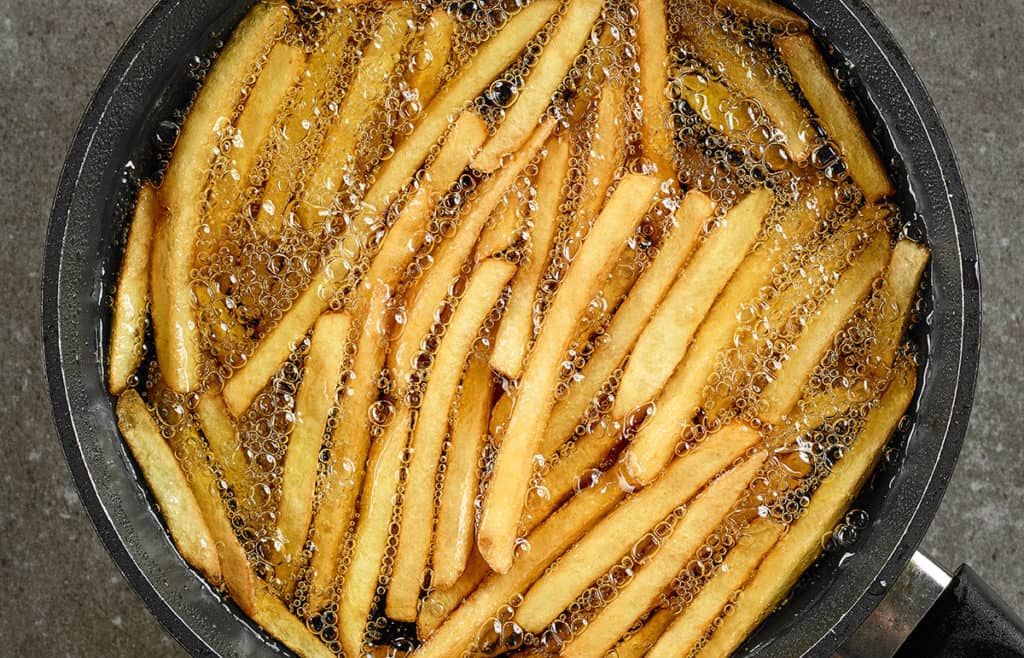While writing our ‘ultimate’ guide to develop your* perfect French Fry we came across a few tips and tricks that we couldn’t do justice in the article. They required more extensive experimentation and evaluation. As such, we decided to dedicate a separate post for those with just a summary in our overall guide.
One of those topics was whether or not your needed to soak (in water or sugar water) or rinse your potatoes before attempting to fry them. There are a lot of (strong) opinions out there, some extensively tested (see our references below), some less so. Since some of these methods do involve a lot of extra time and work, we decided to put them to the test. Could we notice a difference? Or not so much?
*Yes, yours, there isn’t one perfect French fry out there, there can only be one that is perfect for you. But maybe not so perfect for someone else and that’s ok ;-). Table Of Contents
There are a lot of ways to make good (and even more to make bad) french fries. Roughly speaking, the ‘traditional’ standard way to make a french fry involves four steps:
There are a lot of ways to tweak this basic scheme. Some may use an air fryer, others may replace the first fry with a microwave. Others freeze the fries that have been fried once. For this test we decided to focus on an often mentioned suggestion to add a step between step 1 and 2. We’ll call it step 1B.
This step is commonly missed in making homemade fries, but it might be one of the most important! Soaking your fries in cold water helps remove excess starch, which allows for crispy, golden fries! The cold water bath also helps the french fries retain their shape and contributes to a fluffy inside.

Why soak potatoes before frying?
Before looking at what came of these results, let’s have a look at why we even wanted to soak or rinse these potatoes.
Aside from water, the main component of potatoes is starch. Starch is a large carbohydrate, made up of a long chain of sugar (glucose) molecules. Potatoes also contain a small amount of protein, some sugars that aren’t tied up in the starch, and a few other minor ingredients. The composition of the potato depends a lot on the potato variety, as well as on how the potatoes were stored.
Most of these components are locked in place within the cells in a potato. However, once you cut them, you break some of these cells. This releases some of the inner ingredients. By rinsing (as well as soaking) you remove these newly freed components from the potato. This prevents them from possibly interfering with your potato frying process. Two bowls of potatoes. Both have been stored in the fridge overnight and have been cut to the same size, from the same lot of potatoes. The sticks on the right hand side have been rinsed with water before storage, whereas those on the left haven’t. Notice the whitish flecks on the left-hand side potatoes? That is dried up starch.
When you fry potatoes several crucial processes take place. First of all, water within the potatoes evaporates, slightly drying out the potato. This is especially important if you’re after a crispy crust. You will only get crispiness if enough water has left that outer part of your fry.
Secondly, the starch in the potato cooks (which we’ve elaborated on in far greater detail here). Upon cooking the starch absorbs water and swells up. The other major process taking place is the Maillard reaction. This is a reaction between the proteins and sugars in the potato that causes the potato to turn brown during the last fry. All those bubbles you see just after submerging your potatoes in hot oil? Those are water vapor bubbles, rising through the oil.
It is said that excess starch on the outside of the potato can cause potatoes to stick to one another, because of the gelatinization of the starch. Also, it is said that rinsing of some of those excess sugars will reduce the risk of your fries burning and turning black (because of the Maillard reaction).
Interestingly, some actually call for adding sugars by soaking the fries in sugar water. The soak should even out the sugar concentration on the outside of the potato and should help potatoes turn a nice brown.
Dr. Potato isnt a real doctor but a team of potato experts ready to answer all your potato questions. Have a question? Dr. Potato will be sure to get your question answered within a week.
The Best Way To Make French Fries At Home (Restaurant-Quality) | Epicurious 101
FAQ
What happens if you don’t soak fries before frying?
How long should you soak fries before frying?
How long can potatoes soak in water before frying?
Why do you soak fries in vinegar water?
